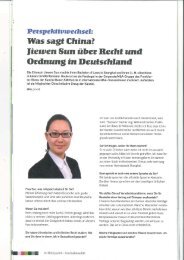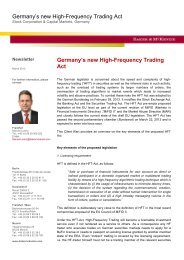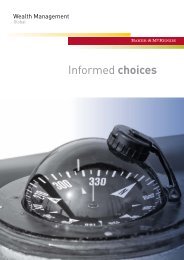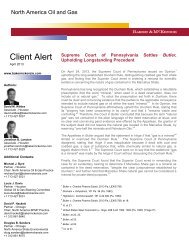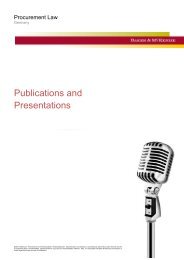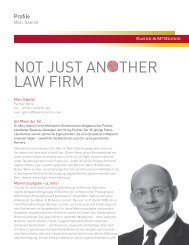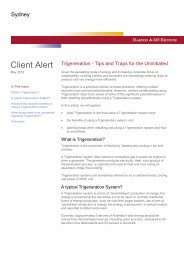Read publication - Baker & McKenzie
Read publication - Baker & McKenzie
Read publication - Baker & McKenzie
You also want an ePaper? Increase the reach of your titles
YUMPU automatically turns print PDFs into web optimized ePapers that Google loves.
Canada<br />
by directly substituting its view of the correct assessment for the CRA’s assessment, 24<br />
referring the assessment back to the CRA for reassessment with particular instructions,<br />
or dismissing the appeal and leaving the assessment intact.<br />
iii Appeals from Tax Court decisions<br />
Both taxpayers and the CRA have a right to appeal judgments and orders of the Tax<br />
Court of Canada to the Federal Court of Appeal. 25 Appellate review proceeds on the basis<br />
of the record before the Tax Court, and parties are unlikely to have an opportunity to<br />
present new evidence on appeal. If either party is unsatisfied with the Court of Appeal’s<br />
disposition, it may seek permission to further appeal the matter to the Supreme Court<br />
of Canada. 26 The Supreme Court may agree to hear an appeal where it considers any<br />
underlying question to be of such public or national importance that it warrants the<br />
Court’s attention. Since the Supreme Court typically decides between two and four tax<br />
appeals per year, the Federal Court of Appeal is the final adjudicator in most federal tax<br />
matters.<br />
iv Objections and appeals to provincial tax assessments<br />
When a civil tax dispute concerns the same issues under parallel federal and provincial<br />
legislation, the federal objection and appeal process will normally proceed, and the related<br />
provincial tax matter will be determined based on the outcome of the federal process. 27<br />
In contrast, if a dispute concerns solely provincial tax issues, the taxpayer must follow<br />
the particulars of the applicable provincial objection scheme. It will then have a right<br />
to appeal the underlying assessment to a court of general jurisdiction in the assessing<br />
province (rather than to a specialised tax court), to that province’s court of appeal and,<br />
with leave, to the Supreme Court of Canada.<br />
24 The Court may only decrease the assessment or leave it intact; it may not increase the disputed<br />
amount.<br />
25 The Federal Court of Appeal is an intermediary appellate court that hears all appeals from orders<br />
of the Tax Court of Canada, the Federal Court and certain federal administrative tribunals. Its<br />
judges come from a wide range of practice backgrounds (not limited to tax), and frequently<br />
have experience as judges of first instance in lower federal or provincial courts. Historically,<br />
approximately 25 to 30 per cent of proceedings in the Federal Court of Appeal are appeals from<br />
the Tax Court.<br />
26 The Supreme Court of Canada is Canada’s highest appellate court and is the final level of<br />
judicial review for all litigation in Canada. The Court hears appeals on all subject matters from<br />
every Canadian jurisdiction, in both official languages and arising under either the common or<br />
civil law tradition.<br />
27 Although such inter-jurisdictional matters raise a variety of issues, coordination is often achieved<br />
through provincial legislation that designates federal assessments or Tax Court dispositions as<br />
binding in respect of provincial tax issues, or which mandates that provincial tax authorities<br />
reassess taxpayers to achieve consistent treatment across federal and provincial regimes.<br />
27



